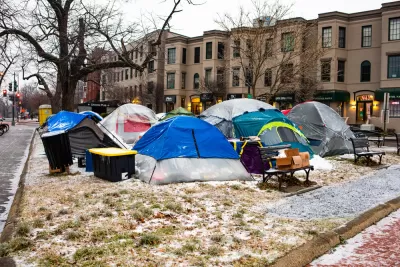The Washington Post’s editorial board calls for immediate and urgent action to reform the District’s housing policies as the region’s affordability crisis mounts.

An op-ed from the Washington Post editorial board argues for urgent action to reform Washington, D.C.’s housing authority and provide more badly needed housing in the region.
The board outlines the findings of a 72-page Department of Housing and Urban Development (HUD) report that highlights the agency’s failures, including 82 “managerial deficiencies.” The list includes “everything from leaving tenants’ personal information unprotected to noncompliance with HUD pet policies to numerous procurement breakdowns to a failure to ‘properly calculate rent’ to being ‘unable to provide documentation of the number of persons on its Public Housing waiting list,’ which hasn’t been updated in 10 years.”
As the op-ed states, thanks to the region’s affordability crisis, reforming DCHA management “cannot proceed at the city’s leisure.” With media home prices hitting $650,000 and the region seeing a shortage of roughly 320,000 housing units by 2030, the editorial board calls for immediate action.
What kind of action, one might ask? “Everything! Housing subsidies, requirements for affordable units in new developments, promotion of employer-sponsored housing projects — they’re all critical to closing the gap between what the workforce earns and what developers collect.”
Pointing to efforts in Arlington and Montgomery counties, which other entities in the region are eyeing cautiously as examples for housing policy reform, the board concludes, “No pain, no gain. Much-needed housing supply won’t build itself.”
FULL STORY: The D.C. region needs more housing. The time to act is now.

Trump Administration Could Effectively End Housing Voucher Program
Federal officials are eyeing major cuts to the Section 8 program that helps millions of low-income households pay rent.

Planetizen Federal Action Tracker
A weekly monitor of how Trump’s orders and actions are impacting planners and planning in America.

Ken Jennings Launches Transit Web Series
The Jeopardy champ wants you to ride public transit.

Rebuilding Smarter: How LA County Is Guiding Fire-Ravaged Communities Toward Resilience
Los Angeles County is leading a coordinated effort to help fire-impacted communities rebuild with resilience by providing recovery resources, promoting fire-wise design, and aligning reconstruction with broader sustainability and climate goals.

When Borders Blur: Regional Collaboration in Action
As regional challenges outgrow city boundaries, “When Borders Blur” explores how cross-jurisdictional collaboration can drive smarter, more resilient urban planning, sharing real-world lessons from thriving partnerships across North America.

Philadelphia Is Expanding its Network of Roundabouts
Roundabouts are widely shown to decrease traffic speed, reduce congestion, and improve efficiency.
Urban Design for Planners 1: Software Tools
This six-course series explores essential urban design concepts using open source software and equips planners with the tools they need to participate fully in the urban design process.
Planning for Universal Design
Learn the tools for implementing Universal Design in planning regulations.
Ada County Highway District
Clanton & Associates, Inc.
Jessamine County Fiscal Court
Institute for Housing and Urban Development Studies (IHS)
City of Grandview
Harvard GSD Executive Education
Toledo-Lucas County Plan Commissions
Salt Lake City
NYU Wagner Graduate School of Public Service





























